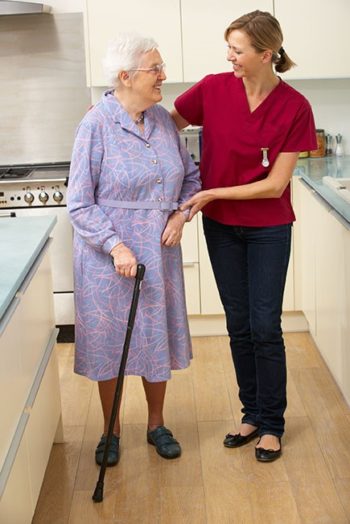
Promoting Healthy Nutrition in the Elderly: Six Ways Home Health Care Makes a Difference
March is National Nutrition Month, and in honor of this annual celebration of healthy living, we’ll discuss how important it is to promote nutrition in the elderly. According to the World Health Organization (WHO), the elderly are particularly vulnerable to malnutrition, compounded by the fact that their nutritional requirements are not well defined. Both lean body mass and basal metabolic rate decline as a person ages, thereby reducing their energy requirements per kilogram of body weight. It’s important to note that many of the diseases that older adults suffer from are the result of dietary issues that many of them have faced since childhood.
But it’s never too late to start instilling good eating habits in the elderly, and it starts at home. Perhaps your loved one is declining in mental or physical capacity but still wants to maintain independence in their own home. You may work full time or have a family of your own and thus can’t be there to ensure they’re eating right at breakfast, lunch, dinner, and in between. That’s where a home health care team comes in to fill the gaps. Here are six ways in which home health care can make a difference in your loved one’s nutrition.
- Choosing the right foods: Studies reveal that a good diet in your later years reduces your risk of anything from osteoporosis and high blood pressure to heart disease and certain cancers, says MedlinePlus. A home health care worker or nurse can help your loved one choose a variety of foods they like to eat that are also good for them. That means avoiding food and drink with empty calories. Obvious choices include chips, soda, cookies and candy, but there are also not-so-obvious choices such as too much bread or yogurts that are surprisingly high in sugar.
- Helping to make the right choices: Home health care dietitians can consult with the rest of your loved one’s team and doctors to come up with a plan that helps them reach their health goals. That entails customizing a dietary plan that encompasses the older adult’s specific health conditions. For example, for someone with high cholesterol, an ideal menu would include foods low in saturated and trans fats. Someone with high blood pressure would need a diet low in salt, and so on. Making sure the diet is high in necessary nutrients is important too, such as calcium for strong bones, folic acid, B12, vitamin D and fiber, says WebMD.
- Daily reminders: Home health aides do more than just provide companionship and assistance with personal care tasks such as bathing and dressing. They can also make sure your loved one eats or has eaten a healthy breakfast, lunch and dinner. Remembering to eat regular, nutritious meals is a challenge for many older people, especially those with dementia, points out the Alzheimer’s Association. As their cognitive function declines, they can get very overwhelmed with too many food choices, causing them to forget how to eat entirely, or even forget how to use utensils.
- Comfortable eating environment: Another way home health care aides and nurses can help with your loved one’s nutrition is to make sure the eating environment is safe and comfortable. This involves heating up meals and making sure they’re not too hot to eat, placing straws in drinks for easy access, serving one or two foods at once to avoid being overwhelmed, providing friendly reminders to chew and swallow carefully, and giving them plenty of time to eat.
- Encourage physical activity: Sometimes, those patients who have had a stroke or joint replacement need physical and occupational therapists who can promote mobility and daily activities. However, even those without a physical ailment can benefit from fresh air and light exercise, such as a walk up the street or a bit of gardening. Lack of physical activity tends to decrease the appetite, so the encouragement of simple exercises is key.
- Food preparation: Preparing their own meals can be time consuming and frustrating to many seniors. As a result, many of them simply neglect good eating habits because it takes too long to make meals or clean up afterwards. Home health care workers can ensure the senior is taking the time to have those three square meals a day by suggesting simple recipes that can be done ahead of time and warmed up in the microwave when hunger hits.
Your home health care team at Pathways Home Health and Hospice can ensure your aging loved one remains independent in their own home yet receives the nutrition they need every day. Call us today at 888-755-7855 to learn more.

